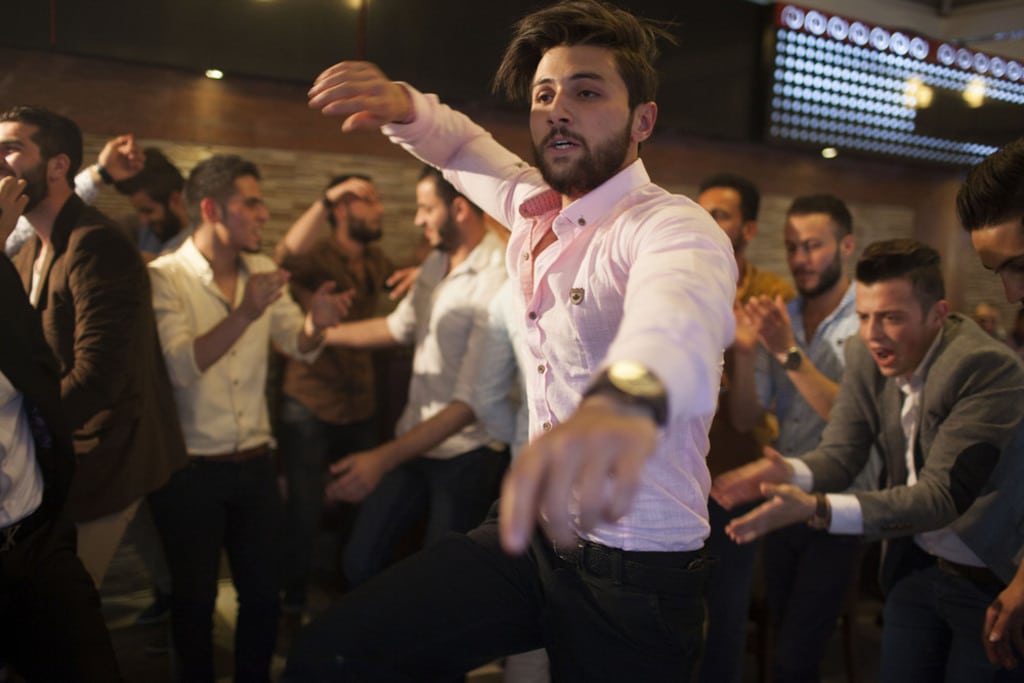
Six years into the country’s civil war, life in Syria is a study in contrasts. Some city neighbourhoods have been reduced to rubble, while in others, cafés, restaurants, nightclubs and even online shopping groups provide a semblance of normalcy.
In places like Damascus and west Aleppo, the Syrian regime has pointed to the continuing nightlife as a sign of ‘business as usual’, although recent attacks and fighting in the regime-held areas in Damascus may put a damper on this.
In September 2016, amid heavy fighting and bombardments of then-rebel-held east Aleppo by Syrian and Russian forces, the state-run Syrian Arab News Agency (SANA) posted a video on Twitter of revellers in a crowded club bobbing to a DJ’s mixes. It was accompanied by the words: ‘#Aleppo, now dubbed the “World’s Most Dangerous City”, still boasts a thriving nightlife, as shown in one of this summer’s events #Syria.’
Although the tweet drew ridicule and outrage from some quarters, the state news agency and tourism department have continued to distribute images of Syrians engaged in seemingly normal activities through photos and videos posted on social media. An aerial video entitled ‘‘Aleppo Will of Life’ shows apparently everyday scenes in the city’s streets and verdant parks and the ancient citadel in areas untouched by the bombing. Another SANA video on Twitter showed a workout session in Damascus’s Tishreen Park, beach resorts in Tartus and hiking around Sweida, near the border with Jordan.
In Damascus, tourism websites tout the city’s growing number of nightclubs. The opposition news site Baladi News Network confirmed this, but complained in July 2016 that historic buildings in the Old City had been converted from cultural sites into ‘night clubs and dens of prostitution’. The site added that the venues are largely frequented by the sons of army officers and members of foreign militias, and that while normal people are barely able to afford bread, the ‘security forces and militias buy luxury drinks priced at hundreds of dollars’. However, the patrons of the new bars also include students and other young people looking for an escape from the troubles around them. “People are tired of war and just want to live a normal life, so they go out, they socialize,” bartender Dana Daqqaq (21) told Reuters, which published a photo essay on the growing Damascus club scene. Like Daqqaq, an increasing number of employees – and patrons – at the new venues are women, as many young men have fled the country to avoid obligatory military service.
Damascus is not immune to violence, as shown by the recent pair of suicide attacks that targeted the main courthouse in the city centre and a popular restaurant in the al-Rawbeh area, killing at least 31 people and wounding dozens more.
The renewed violence is likely to persuade some to stay at home, and the majority of Syrians cannot afford to patronize these types of businesses anyway. Throughout the country, residents have felt the financial effects of the war, as the economy has collapsed and prices increased for everything from bread to apartments.
An International Monetary Fund assessment of the country’s economic situation released in June 2016 concluded that ‘the conflict has set the country back decades in terms of economic, social and human development’. It noted that the country’s gross domestic product is less than half what it was before the war started, inflation is high and the population is struggling with ‘widespread unemployment and homelessness, food and medicine shortages, and destruction of public services and infrastructure’. More than two-thirds of the country’s remaining population was found to be living in extreme poverty and scrambling to acquire the basic necessities of life.
According to the independent news site Enab Baladi, in the besieged al-Waer area of Homs – where evacuation recently commenced – women who used to get together in the morning over a cup of coffee, now gather in the streets to search for sticks to fuel their stoves, as oil and gas is no longer available.
Even in Damascus, residents struggle to cope with prices that have skyrocketed since the beginning of the war. Enab Baladi estimates that rents rose by 300% from 2010 to 2016, a result of the declining value of the Syrian pound and the influx of displaced residents who fled to the city to escape the fighting in their areas. Sanctions and the destruction of much of the country’s infrastructure have reduced imports and exports to a tiny fraction of their pre-war level. Armed groups have taken control of agricultural land to use as a bargaining chip. Combined with a poor wheat harvest last year, the price of food has risen sharply.
A report by REACH, a joint initiative of two NGOS and a United Nations programme, found that in northern Syria, the median price of bread rose by 38% between January and August 2016. Over the past two years, monitoring of the market conditions ‘has in most months reported rising food prices, increasing exchange rates and an ever-greater cost of living for Syrian households’.
The report also noted that residents of regime-controlled areas receive some subsidies for basic goods, but since 2014, the government has reduced subsidies on bread, rice, sugar and water and shuttered government-run bakeries in opposition areas. Meanwhile, a thriving black market has developed, selling luxury goods like imported sweets and cigarettes.
In the few areas where residents have consistent internet access, online marketplaces have sprung up to buy and sell goods like clothing and furniture through Facebook groups. The online forums provide a respite from the numerous checkpoints that customers have to navigate when shopping offline, and a venue for sellers who are unable to afford to open a physical shop.


